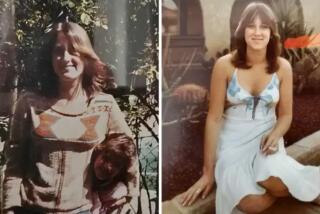Trucker on Trial in Deaths of Four Called a âMonsterâ
As he traveled across the state, long-haul trucker Wayne Adam Ford combed dark roadways for vulnerable young women -- women desperate enough to climb into the cab of his truck and trade sex for cash. Women, a prosecutor told jurors Wednesday, who might not be missed.
Four women did vanish in 1997 and 1998 after being picked up by Ford, and their naked bodies -- some of them dismembered -- washed up in aqueducts and other waterways.
The killings stopped when Ford walked into the Humboldt County Sheriffâs Department one evening in late 1998 with the severed breast of one victim in his pocket and confessed to the slayings, which he said were accidental.
In his closing argument in San Bernardino County Superior Court, Deputy Dist. Atty. J. David Mazurek told jurors not to be swayed by Fordâs confession. Ford is a âmonster,â he said, and guilty of four counts of first-degree murder.
âThe defendant devoured these vulnerable young women to satisfy his sexually sadistic appetite,â he said, and left their bodies âscattered like trash throughout the state.â
The attacks, Mazurek argued, were carefully planned, as was revealed by a woman who survived.
The prosecutor reminded the jury of âSonoma County Jane Doeâsâ testimony during the three-month trial that Ford picked her up off a street corner and told her he chose her because she was small and more easily controlled. She said he bound, raped and strangled her, before reviving her and dumping her on the side of the road, tied up with nylon rope and a striped brown necktie.
âThe defendant is a sexual sadist.... It is the infliction of pain and suffering that arouses him,â Mazurek told the jury.
âYou might give him the first one,â he said, scoffing at Fordâs claim of the deaths being accidental, âbut if you repeatedly do an act over and over again -- is that an accident?â
Ford, 44, scribbled notes on loose-leaf paper throughout the trial and vigorously shook his head when Mazurek argued that Ford killed the women through torture and âgot offâ on their suffering.
For Ford to be eligible for the death penalty, the jury would have to find him guilty of two counts of murder, including one count of first-degree murder.
Deputy Public Defender Steve Mapes told jurors the prosecution failed to show âevidence of careful deliberationâ and that they must weigh the possibility that his client took rough sexual acts too far, but did not intend to kill the women.
In the defenseâs closing argument, which will continue this morning, Mapes told jurors that they had to consider Fordâs borderline personality disorder, alcoholism, depression, as well as his anger about his second divorce and his estrangement from his young son.
âThereâs no way you can decide this case without going into Mr. Fordâs mind, without going into the things in his life that made him snap,â Mapes said. âPeople with mental impairments do handle lifeâs stresses differently.â
When he turned himself in, Ford told authorities he did not know how the four women died. But he told authorities that he frequently engaged in âerotic asphyxiation,â which entails constricting the flow of oxygen to the brain by strangling oneâs partners to enhance their sexual pleasure, sometimes reviving them with CPR.
Autopsies determined that Tina Renee Gibbs, 26, a Las Vegas prostitute, and Patricia Ann Tamez, 29, a prostitute from Hesperia, died of strangulation.
Detectives could not determine the cause of death of Lanett Deyon White, 25, a Fontana prostitute, because her body was too decomposed when authorities found it in a San Joaquin County irrigation canal.
The body of the first victim, Humboldt County Jane Doe, was so severely dismembered that she has never been identified. A kayaker found the torso of the woman, who Ford said was a hitchhiker, in a slough in Eureka.
After being persuaded by his brother to confess to the killings, Ford led investigators to his trailer where parts of Humboldt County Jane Doeâs body were found in his freezer.
DNA evidence also linked Ford to some of the killings, the prosecutor said.
*
Times staff writer Lance Pugmire contributed to this report.
More to Read
Sign up for Essential California
The most important California stories and recommendations in your inbox every morning.
You may occasionally receive promotional content from the Los Angeles Times.











